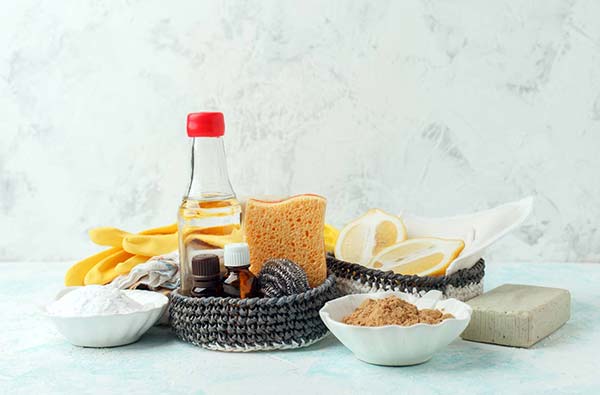
Monday – Friday: 10am – 7pm
Saturday: 10am – 6pm
Sunday: 1pm – 6pm

Spring is finally here! It’s time to throw open the windows for fresh air and get down to the business of deep-cleaning your home. But mopping up mildew and scouring away grime doesn’t have to mean exposing your household to toxic cleaning solutions.
Consider these home- and Earth-friendly options instead.
Today we have hundreds of cleaning products to choose from, but you can’t go wrong with the old standbys.
Vinegar and baking soda can be used to clean almost anything—mixed with a little warm water these kitchen staples make great all-purpose cleaners.
Vinegar is effective for removing bacteria and mildew. A 50-50 vinegar-and-water mix can be kept in a spray bottle in the fridge for easy access. Simply spray and wipe. (But don’t use on marble or granite.) This solution can be used to disinfect doorknobs, faucets, and other places that get a lot of hands-on use.
Baking soda is an effective, natural carpet deodorizer. Just dust the carpet with baking soda, let it sit for 20 minutes, then vacuum.
To keep bathroom drains running freely, pour a half cup of baking soda into the drain, and run a little hot water to wash it down. Leave for two hours to overnight, and then flush with hot water. This won’t clear blocked drains, but pouring a bit of vinegar over the baking soda might do the trick.
Air fresheners tend to release unwelcome chemicals. Buy fresh flowers or hang dried lavender or eucalyptus instead. Boiling cinnamon, cloves, or other herbs will also release pleasant scents.
Adding a few drops of essential oils to your natural cleaning solutions provides a pleasing aroma and antimicrobial effects. According to Aura Cacia, a producer of essential oils, these oils are best for household cleaning
In addition to its clean, uplifting scent, lemon’s acidic properties provide antibacterial and antiseptic cleaning actions. It can help remove stains.
This purifies air and acts as a mild pest repellent. Mix peppermint with lemon for a refreshing smell. It also blends well with lavender, eucalyptus, and rosemary. Ants avoid chili powder and dried peppermint. Spread either of these near their entry point instead of a toxic insecticide.
These distinctive-smelling oils work as air and surface sanitizers. Tea tree oil works well on mold and mildew, as well as musty smells.
Pine essential oil acts as a disinfectant and a deodorizer.
It has a pleasing scent, is antibacterial, and deters insects such as moths.
Washing your clothes in cold water saves energy. For best results, choose a detergent made specifically for cold water.
When laundering whites, consider hydrogen peroxide instead of bleach. A cup of 3 percent hydrogen peroxide is inexpensive, color safe, and less harmful to the environment.
Here are more helpful hints for keeping your home and the Earth in top shape.
When you’re standing in the cleaning products aisle at the supermarket, the sheer number of choices available can be overwhelming. The Safer Choice label, developed by the Environmental Protection Agency (EPA) makes finding safe cleaning products easier.
Each product being considered for a Safer Choice label undergoes a thorough review of every ingredient—no matter how much or how little is contained in the final product—and products must meet stringent criteria for the safety of humans and the environment including:
Thousands of products now carry the Safer Choice label.
365 Ways to Live Green by Diane Gow McDilda ($7.95, Adams Media, 2008)
“Care for your air: A guide to indoor air quality,” US Environmental Protection Agency, www.epa.gov
“Cleaning with vinegar” by Berit Thorkelson, Better Homes and Gardens, www.BHG.com
Eco-Friendly Families by Helen Coronato ($15.95, Alpha Books, 2008)
The Green Year by Jodi Helmer ($14.95, Alpha Books, 2008)
“Homemade household cleaners,” www.GoodHousekeeping.com
“How to green your cleaning routine,” www.TreeHugger.com, 6/27/14
“Teach children to clean,” www.HGTV.com
“Learn about the Safer Choice label,” www.epa.gov